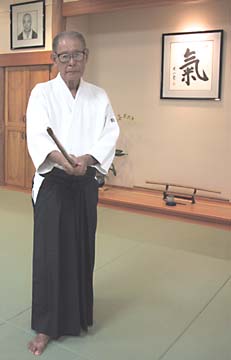
GARY KUBOTA / GKUBOTA@STARBULLETIN.COM
86-year-old instructor
observes 50th anniversary
of aikido in Hawaii
WAILUKU >> Maui police officer Shinichi Suzuki was watching a movie newsreel at an open-air theater in Waikapu in 1953 when he saw the martial art of aikido demonstrated by a modestly built man who used various techniques to throw five judo experts.
"I said, 'The police got to have this, and I've got to learn this,'" Suzuki recalled.
Suzuki, then 36, who had been studying judo for eight years, said he was amazed when he met the aikido expert several weeks later on Maui. The man, Koichi Tohei, had been sent by aikido founder Morihei Ueshiba of Tokyo to introduce the martial art to the West, with Hawaii as his first stop.
Tohei selected Suzuki to participate in intensive training of the martial art with the intent of teaching it for free to recruits at the Maui Police Department.
This year, the Hawaii Ki Federation, including the Maui-Ki Aikido dojo, is celebrating the 50th anniversary of aikido instruction in Hawaii and its introduction in the West.
Suzuki, now 86, is also observing his 50th year as the chief martial arts instructor with the Maui Police Department.
Maui Police Chief Thomas Phillips, who as a recruit went through martial arts training through Suzuki, described the aikido master as an excellent teacher. "It was one of the highlights of my class," Phillips said.
Suzuki said he chooses to receive no fee from the police or the dojo because he believes teaching aikido is his "community service."
Suzuki has received a number of commendations for his martial arts work, including his selection in the Black Belt Magazine Aikido Instructor Hall of Fame and designation as a "Living Treasure" by the Honpa Hongwanji Mission of Hawaii in 1996.
Unlike many other martial arts such as judo, tae kwon do and karate, the practitioners of aikido have no tournaments.
Some practitioners have compared it to yoga in its attention to meditation. Suzuki said aikido is not a sport, but a way to discipline the mind and body and develop oneself physically, mentally and spiritually.
"In aikido there is no such thing as win or lose," he said. "You train."
Suzuki, who retired as a police major in 1972, recalled he never had to use the physical aspect of aikido to overcome a criminal, but aikido helped him to improve his attitude toward himself and others.
"You want to control other people, you have to control yourself first," he said.
Through his instruction, Suzuki has helped to articulate the Eastern philosophy behind aikido.
Unlike the Western approach with its emphasis on logic to arrive at truths, Japanese philosophy focuses on developing intuitive thinking and eliminating preconceived ideas to see the world as it actually is.
Before every training session, aikido students undergo breathing exercises and meditate with the understanding that before they can fill their minds, they must empty them.
Suzuki, an eighth-dan black belt in aikido and the highest-ranking aikido instructor outside of Japan, follows a rigorous personal training schedule each day.
Awaking before sunrise, he sits alone at home for several hours and performs breathing and meditation exercises.
Suzuki said the exercises are part of his personal development.
"If you want to develop yourself, you want to train every day," he said.
The emphasis in aikido is to control the "ki," a universal force that unites the mind and body.
Aikido instructors believe the gateway for the ki is located about two to four inches below the navel.
Students practice centering their body through it and extending their ki.
In an aikido test, a student whose ki is centered and capable of being extended to his fingers is expected to have an arm that is virtually un-bendable.
Christopher Curtis, a seventh-dan black belt and the chief instructor for the Hawaii Ki Federation, said the point of aikido is to reduce the physical tension around oneself before a violent confrontation develops.
"If you are free of physical tension yourself, the people around you will have less physical tension. It's a kind of metaphor for everyday relationships," Curtis said. "The whole point is, we practice to bring things into harmony. ... If you have to use actually physical aikido in life, you've made some mistakes already."
Curtis said that of all women with aikido black belts in the world, the Maui dojo has the highest-ranking.
He said there are about 497 students of aikido in Hawaii, including 196 on Maui, more than half of them children. "It's terrific for kids. We really have a good response from parents."
